Therapy is one of the most important steps a person can take to improve their mental health. It can be lifesaving in some cases. Despite this, many people are reluctant to seek therapy for a variety of reasons. In this article, we will discuss the benefits of therapy sessions, why you should consider them, and how to find a good therapist. We will also hear from experts about their experiences with therapy and what they have gained from it.
Contents
Understanding Therapy
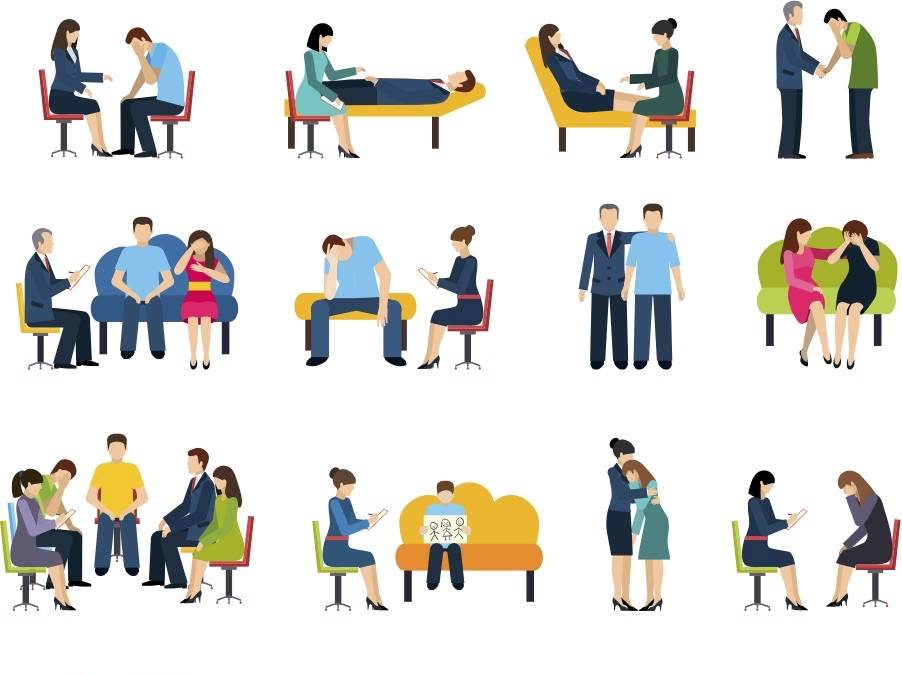
Therapy, also known as psychotherapy, is a process that involves working with a therapist to identify and address problems. The therapist will help you understand your thoughts and feelings and give you the tools to deal with them.
Goal of Therapy
The goal of therapy is to help you improve your mental health and wellbeing. You may experience relief from symptoms such as anxiety, depression, or PTSD. You may also learn new skills that will help you cope with difficult situations.
Types of Therapy
There are many different types of therapy, but all share the same goal: to help you improve your mental health. Some of the most common types of therapy include:
EMDR: This type of therapy helps you process and heal from trauma.
Cognitive Behavioral Therapy: This type of therapy helps you identify and change negative thought patterns.
Dialectical Behavior Therapy: This type of therapy teaches you how to deal with difficult emotions.
Exposure Therapy: This type of therapy helps you confront your fears in a safe and controlled environment.
Family Therapy: This type of therapy helps you improve communication and resolve conflict within your family.
Group Therapy: This type of therapy helps you share your experiences with others and receive support.
Other Therapies: There are many other types of therapy, including art therapy, music therapy, and pet therapy.
- Art Therapy – This type of therapy uses art to help you express your thoughts and feelings.
- Music Therapy – This type of therapy uses music to help you relax and improve your mood.
- Pet Therapy – This type of therapy uses animals to help you reduce stress and anxiety.
History, and Development
The history of therapy dates back to the 1800s. At that time, it was known as “moral treatment” and focused on helping people with mental illness. The first psychotherapy clinic opened in 1882.
In the early 1900s, Sigmund Freud developed psychoanalysis, which is a type of therapy that focuses on the unconscious mind. Freud believed that the root of mental illness was repressed memories and thoughts.
In the 1950s, Carl Rogers developed client-centered therapy, which is a non-directive type of therapy that focuses on the relationship between therapist and client.
In the 1970s, Aaron Beck developed cognitive behavioral therapy, which is a type of therapy that focuses on changing negative thought patterns.
Today, there are many different types of therapy, and new ones are being developed all the time.
Evaluating Therapy
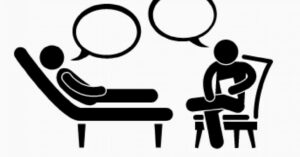
If you are considering therapy, it is important to do your research and find a therapist who is right for you. There are a few things to keep in mind when evaluating therapy:
- Therapist’s Qualifications: Make sure the therapist is qualified to provide therapy. They should have a degree in psychology or another related field.
- Therapy Approach: Each therapist has their own approach to therapy. Make sure the therapist’s approach matches your needs and interests.
- Location and Cost: Therapy can be expensive, so make sure you can afford it. Also, check to see if the therapist has a location near you.
- Therapy Duration: Most therapy sessions last around 50 minutes, but some therapists offer longer or shorter sessions.
Why Consider Therapy
Now that you know a little bit about therapy, let’s talk about why you should consider it. Therapy can offer many benefits, including:
Reduced stress and anxiety: Therapy can help you reduce stress and anxiety. If you are struggling with high levels of stress or anxiety, therapy may be a good option for you.
Relief from symptoms of mental illness: If you are struggling with anxiety, depression, PTSD, or another mental illness, therapy can help you relieve your symptoms.
Gains in self-esteem and confidence: Therapy can help you develop a healthier sense of self-esteem and confidence. If you have low self-esteem or lack confidence, therapy can help you improve these areas.
Improved communication and relationships: Therapy can help you improve your communication skills. This can be especially helpful in relationships with family members, friends, and romantic partners. Therapy can also help you resolve conflicts more effectively.
New skills to cope with difficult situations: In therapy, you learn new skills to deal with difficult situations. Some of the skills you may learn include:
- Problem-solving skills
- Coping skills
- Communication skills
- assertiveness training
- Conflict resolution skills
- Emotional regulation skills
- Self-care skills
NOTE: In therapy, you have a safe place (supportive environment) to share your thoughts and feelings. You don’t have to worry about being judged or criticized.
Finding a Good Therapist

If you are thinking about seeing a therapist, the first step is to talk to your doctor. This is because therapy is most effective when it is tailored to your individual needs.
Your doctor can refer you to a therapist who meets your needs and suits your budget. You can also search for a therapist on your own.
Handy Tips To Get Started
Here are some tips for finding a good therapist:
Check the therapist’s qualifications: Make sure the therapist is qualified to provide therapy. They should have a degree in psychology or another related field.
Look for a therapist who uses an evidence-based approach: An evidence-based approach is one that has been proven to be effective. Make sure the therapist you choose uses an approach that has been shown to be helpful for your specific needs.
Look for a therapist with good reviews: Look for therapists who have positive reviews from their clients. This can give you a good idea of what to expect from therapy.
Talk to the therapist on the phone: Once you have found a therapist you are interested in, call them and ask any questions you have. This can help you decide if the therapist is right for you.
Questions To Ask Me Before Therapy
If you are considering therapy, there are a few questions you should ask me before attending your first session:
- What is the therapist’s experience in treating my problem?
- What is the therapist’s therapeutic approach?
- How long will each session last?
- How often will I need to attend therapy sessions?
- What are the therapist’s fees?
- Is the therapist licensed in my state?
- Is the therapist insured?
- What is the therapist’s policy on confidentiality?
- What should I do if I am not comfortable with the therapist?
NOTE: If you have any questions or concerns, be sure to discuss them with the therapist before starting therapy.
Things To Look Out For
When choosing a therapist, it is important to find someone you feel comfortable with. Here are some things to look for in a therapist:
- A good fit: It is important to find a therapist who is a good fit for you. Some things to consider include the therapist’s personality, therapeutic approach, and fees.
- Experience: It is important to choose a therapist who has experience in treating your problem.
- Licensed: Make sure the therapist is licensed in your state.
- Insured: Make sure the therapist is insured.
Red Flags To Avoid
If you have any of the following concerns, it is important to address them with the therapist before starting therapy:
- The therapist is judgmental or critical.
- I am not getting the results I want from therapy.
- The therapist does not respect my boundaries.
- I do not feel comfortable with the therapist.
- The therapist is trying to change my beliefs or values.
- I feel being pushed to do something I am not comfortable with.
- The therapist is not listening to me or seems uninterested in what I am saying.
NOTE: If you don’t like your therapist, you can talk to them about your concerns. If you still don’t feel comfortable with them, you can ask for a referral to another therapist.
Attending a Therapy Session
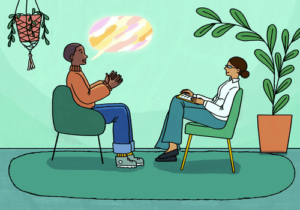
If you decide to start therapy, the first step is to schedule an appointment with a therapist. You can find a list of qualified therapists in your area by searching online or asking your doctor for a referral.
Thins To Keep In Mind
When you attend your first therapy session, there are a few things to keep in mind:
Be open and honest: In order to get the most out of therapy, you need to be open and honest with your therapist. This means that you should share your thoughts and feelings, even if they are difficult to talk about.
Be patient: It takes time to build trust with a therapist. It may take several sessions before you feel comfortable sharing your deepest thoughts and feelings.
Take an active role: Therapy is not a passive process. You need to actively participate in therapy in order to make progress. This means that you should be willing to try new things and explore your thoughts and feelings.
How Does It Work
In therapy, you meet with a therapist to discuss your thoughts and feelings. The therapist will ask you questions and help you explore your thoughts and feelings. The goal of therapy is to help you understand yourself better and resolve the issues that are causing you distress.
The First Session
The first session is usually the longest, and subsequent sessions are typically shorter. Most therapy sessions last around 50 minutes.
During the first session, the therapist will ask you questions about your life and your problem. They will also ask you about your goals for therapy. This is called an intake interview.
After Intake Interview
After the intake interview, the therapist will develop a treatment plan. The treatment plan will outline the goals of therapy and how to achieve them.
The therapist will also give you a copy of the treatment plan to take home with you.
How Is It Like
Therapy sessions are like conversations between friends. The therapist is there to listen and offer support. They will not judge or criticize you. You can talk about anything that is on your mind.
Your therapy sessions are confidential. This means that the therapist cannot share what you say in therapy with anyone else without your permission.
What To Expect
Most people find therapy helpful. However, it is important to remember that not everyone will benefit from therapy. Some people may find it uncomfortable or challenging to talk about their thoughts and feelings.
If you are feeling uncertain about therapy, you can talk to the therapist about your concerns. They will be able to answer any questions you have.
It is also important to remember that therapy takes time. You will not see results overnight. It may take several weeks or months of therapy before you see improvements.
The number of sessions you need will depend on your goals for therapy and the severity of your problem. Most people need around 12 to 16 sessions.
How Much Do They Cost
Therapy can be expensive, but there are ways to reduce the cost. Many therapists offer a sliding scale fee, which means that the cost depends on your income.
Some therapists also offer reduced rates for therapy sessions that last longer than 50 minutes.
You can also ask your therapist if they offer group therapy. Group therapy is usually less expensive than individual therapy.
NOTE: If you are not sure if therapy is right for you, talk to someone who has seen a therapist. They can share their experiences and tell you what they gained from therapy.
Counting Benefits of Therapy
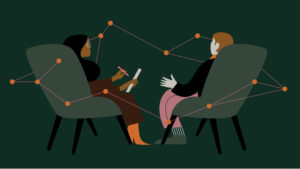
Therapy is not a quick fix. It takes time and effort to see results. However, the benefits of therapy are many:
Learn new skills: One of the main goals of therapy is to help you learn new skills. These skills can help you resolve your problems and improve your life.
Make progress: With therapy, you make progress. You learn to understand yourself better and resolve the issues that are causing you distress.
Remove stigma and discrimination: Therapy can help remove the stigma and discrimination associated with mental health problems.
Take a step to improve your life: Taking the step to see a therapist is an important one. It shows that you want to improve your life.
Skills You Learn
Therapy teaches you a variety of skills that can help you resolve your problems and improve your life. These skills include:
Problem-solving skills: Problem-solving skills are one of the most important skills learned in therapy. They enable you to identify and solve problems in your life.
Emotional regulation skills: Emotional regulation skills help you to control and manage your emotions. These skills are important for managing stress and anxiety.
Communication skills: Communication skills enable you to communicate effectively with others. They also help you to express your needs and wants.
Assertiveness skills: Assertiveness skills allow you to stand up for yourself in a respectful way. They help you to get your needs met without upsetting others.
Coping skills: Coping skills help you to deal with stress and difficult situations. They enable you to cope with life’s challenges in a healthy way.
Personal Gains You Make
Therapy can have a number of personal benefits, including:
Develop self-confidence: With therapy, you develop self-confidence. This means that you trust yourself and your abilities.
A better understanding of yourself: With therapy, you gain a better understanding of yourself. You learn about your thoughts, feelings, and behaviors.
Feel better about yourself: When you work on your problems in therapy, you start to see yourself in a more positive light. You learn to accept and forgive yourself for the mistakes you have made.
Become more independent: As you work on your problems in therapy, you become more independent. This means that you are able to rely on yourself more and do not need others to help you solve your problems.
Develop a support system: When you see a therapist, you develop a support system. This is because your therapist is someone you can rely on and trust.
You improve your mental health: Mental health problems can be resolved with therapy. You learn healthy coping skills that help you manage stress and anxiety.
Removing Stigma And Discrimination With Therapy

Therapy can help remove the stigma and discrimination associated with mental health problems. When you see a therapist, you send the message that it is okay to seek help for your mental health problems.
You also break down the barriers that exist between people who have mental health problems and those who do not. This can lead to better understanding and support for people with mental health problems.
Encouraging Loved One For Therapy
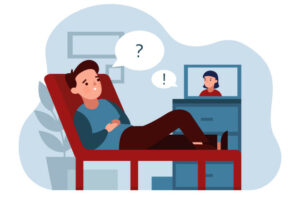
If you are concerned about someone you love, you may want to encourage them to see a therapist. Here are some tips:
If you have a loved one who is struggling with mental health problems, you may be wondering how to encourage them to seek help. Here are some tips:
Express your concern: The first step is to express your concern for your loved one’s well-being. Tell them that you want what is best for them and that you are worried about their mental health.
Listen to their concerns: Listen to your loved one’s concerns about therapy. It is important that they feel heard and understood. So be all ears and address their concerns patiently.
Offer support: Offer to support your loved one in their decision to seek help. This can include going with them to their first appointment or being there for them during treatment.
Be positive: It is important to be positive about therapy. Do not say things like “therapy won’t help” or “it’s a waste of time.” This can discourage your loved one from seeking help.
Hearing From Experts
If you are considering therapy, it is important to hear from experts. Here are some quotes from experts on the benefits of therapy:
“Therapy is a powerful tool that can help you understand and resolve the problems that are causing you distress. It can also help you learn healthy coping skills that will improve your mental health.” -American Psychological Association
“Therapy is not just for people with serious mental health problems. It can be helpful for anyone who wants to learn more about themselves and their relationships.” -American Psychological Association
Books And Resources
If you are considering therapy, it is important to do your research. There are many great books and resources on therapy. Here are a few:
- “The Therapist’s Guide to Psychotherapy with Men” by Ronald F. Levant, PhD
- “The Essential Family Guide to Mental Health Care” by Stuart C. Yudkin, MD and Karen J. Hacker, MD
Conclusion
Therapy is a valuable tool that can help you resolve your problems and improve your life. It can also help to remove the stigma and discrimination associated with mental health problems. If you or someone you know is considering therapy, encourage them to see a therapist. This shows that you support their decision to seek help. You can also do your part to remove the stigma and discrimination associated with therapy by encouraging a loved one to see a therapist.
A Word From Therapy Mantra
Your mental health — Your psychological, emotional, and social well-being — has an impact on every aspect of your life. Positive mental health essentially allows you to effectively deal with life’s everyday challenges.
At TherapyMantra, we have a team of therapists who provide affordable online therapy to assist you with issues such as depression, anxiety, stress, workplace Issues, addiction, relationship, OCD, LGBTQ, and PTSD. You can book a free therapy or download our free Android or iOS app.


